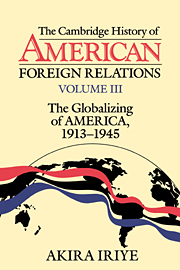Book contents
- Frontmatter
- 1 The age of European domination
- 2 The Great War and American neutrality
- 3 The United States at war
- 4 The Versailles peace
- 5 The 1920s: the security aspect
- 6 The 1920s: the economic aspect
- 7 The 1920s: the cultural aspect
- 8 The collapse of international order
- 9 Totalitarianism and the survival of democracy
- 10 The emergence of geopolitics
- 11 The road to Pearl Harbor
- 12 The global conflict
- Bibliographic Essay
- Index
- THE CAMBRIDGE HISTORY OF AMERICAN FOREIGN RELATIONS
- References
4 - The Versailles peace
Published online by Cambridge University Press: 28 March 2008
- Frontmatter
- 1 The age of European domination
- 2 The Great War and American neutrality
- 3 The United States at war
- 4 The Versailles peace
- 5 The 1920s: the security aspect
- 6 The 1920s: the economic aspect
- 7 The 1920s: the cultural aspect
- 8 The collapse of international order
- 9 Totalitarianism and the survival of democracy
- 10 The emergence of geopolitics
- 11 The road to Pearl Harbor
- 12 The global conflict
- Bibliographic Essay
- Index
- THE CAMBRIDGE HISTORY OF AMERICAN FOREIGN RELATIONS
- References
Summary
The new peace
The Paris peace conference was convened on January 18, 1919, and lasted until June 28, when a peace treaty with Germany was signed at the Versailles palace. During these five months, the leaders of the victorious nations sat together and discussed not only the peace terms to be imposed upon the former enemy but also the shape of the postwar world. President Woodrow Wilson personally participated, as did the leaders of the European cobelligerents: David Lloyd George (Britain), Georges Clemenceau (France), Vittorio Orlando (Italy). Two Asian countries that had been involved in the war, China and Japan, were also represented at the Paris Conference, although they did not send their respective heads of government. The participation of these countries as well as the United States in a conference to settle a war that had originated in Europe was a clear indication of the passing of the European-dominated world order.
Each participating nation had its own agenda. The United States had already articulated what it considered to be desirable terms of peace in Wilson’s Fourteen Points. The president and his entourage in Paris were determined to define a peace that reflected those terms as much as possible. That was also the German delegation’s expectation; having agreed to a cease-fire on the basis of the Fourteen Points, Berlin’s representatives believed only a peace along those lines would be acceptable to the nation that was reeling from a post-cease-fire chaos; the military was refusing to admit defeat, while radicals, under Bolshevik influence, were threatening to seize control of government.
- Type
- Chapter
- Information
- The Cambridge History of American Foreign Relations , pp. 58 - 72Publisher: Cambridge University PressPrint publication year: 1993



